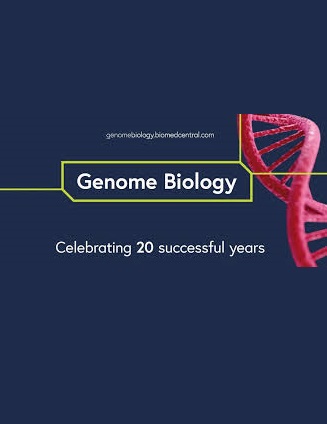Identifying associations of de novo noncoding variants with autism through integration of gene expression, sequence, and sex information
IF 10.1
1区 生物学
Q1 BIOTECHNOLOGY & APPLIED MICROBIOLOGY
引用次数: 0
Abstract
Whole-genome sequencing (WGS) data has facilitated genome-wide identification of rare noncoding variants. However, elucidating these variants’ associations with complex diseases remains challenging. A previous study utilized a deep-learning-based framework and reported a significant brain-related association signal of autism spectrum disorder (ASD) detected from de novo noncoding variants in the Simons Simplex Collection (SSC) WGS cohort. We revisit the reported significant brain-related ASD association signal attributed to deep-learning and show that local GC content can capture similar association signals. We further show that the association signal appears driven by variants from male proband-female sibling pairs that are upstream of assigned genes. We then develop Expression Neighborhood Sequence Association Study (ENSAS), which utilizes gene expression correlations and sequence information, to more systematically identify phenotype-associated variant sets. Applying ENSAS to the same set of de novo variants, we identify gene expression-based neighborhoods showing significant ASD association signal, enriched for synapse-related gene ontology terms. For these top neighborhoods, we also identify chromatin state annotations of variants that are predictive of the proband-sibling local GC content differences. Overall, our work simplifies a previously reported ASD signal and provides new insights into associations of noncoding de novo mutations in ASD. We also present a new analytical framework for understanding disease impact of de novo mutations, applicable to other phenotypes.通过整合基因表达、序列和性别信息,鉴定新生非编码变异与自闭症的关联
全基因组测序(WGS)数据促进了罕见的非编码变异的全基因组鉴定。然而,阐明这些变异与复杂疾病的关联仍然具有挑战性。先前的一项研究利用基于深度学习的框架,报道了从Simons Simplex Collection (SSC) WGS队列的新生非编码变异中检测到自闭症谱系障碍(ASD)的显著脑相关关联信号。我们回顾了报道的与深度学习相关的显著脑相关ASD关联信号,并表明局部GC内容可以捕获类似的关联信号。我们进一步表明,关联信号似乎是由位于指定基因上游的男性先证者-女性兄弟姐妹对的变异驱动的。然后,我们开发表达邻域序列关联研究(ENSAS),利用基因表达相关性和序列信息,更系统地识别表型相关的变异集。将ENSAS应用于同一组新生变异,我们发现了基于基因表达的邻域,显示出显著的ASD关联信号,丰富了突触相关的基因本体术语。对于这些顶级邻域,我们还确定了变体的染色质状态注释,这些注释可以预测先发-兄弟本地GC含量差异。总的来说,我们的工作简化了先前报道的ASD信号,并为ASD中非编码新生突变的关联提供了新的见解。我们还提出了一个新的分析框架来理解新生突变对疾病的影响,适用于其他表型。
本文章由计算机程序翻译,如有差异,请以英文原文为准。
求助全文
约1分钟内获得全文
求助全文
来源期刊

Genome Biology
Biochemistry, Genetics and Molecular Biology-Genetics
CiteScore
21.00
自引率
3.30%
发文量
241
审稿时长
2 months
期刊介绍:
Genome Biology stands as a premier platform for exceptional research across all domains of biology and biomedicine, explored through a genomic and post-genomic lens.
With an impressive impact factor of 12.3 (2022),* the journal secures its position as the 3rd-ranked research journal in the Genetics and Heredity category and the 2nd-ranked research journal in the Biotechnology and Applied Microbiology category by Thomson Reuters. Notably, Genome Biology holds the distinction of being the highest-ranked open-access journal in this category.
Our dedicated team of highly trained in-house Editors collaborates closely with our esteemed Editorial Board of international experts, ensuring the journal remains on the forefront of scientific advances and community standards. Regular engagement with researchers at conferences and institute visits underscores our commitment to staying abreast of the latest developments in the field.
 求助内容:
求助内容: 应助结果提醒方式:
应助结果提醒方式:


